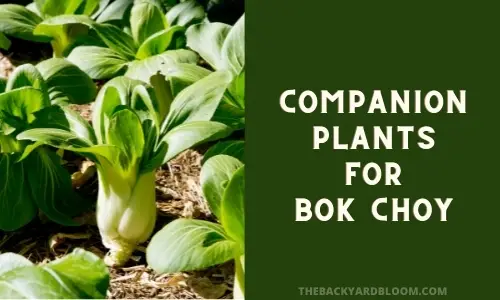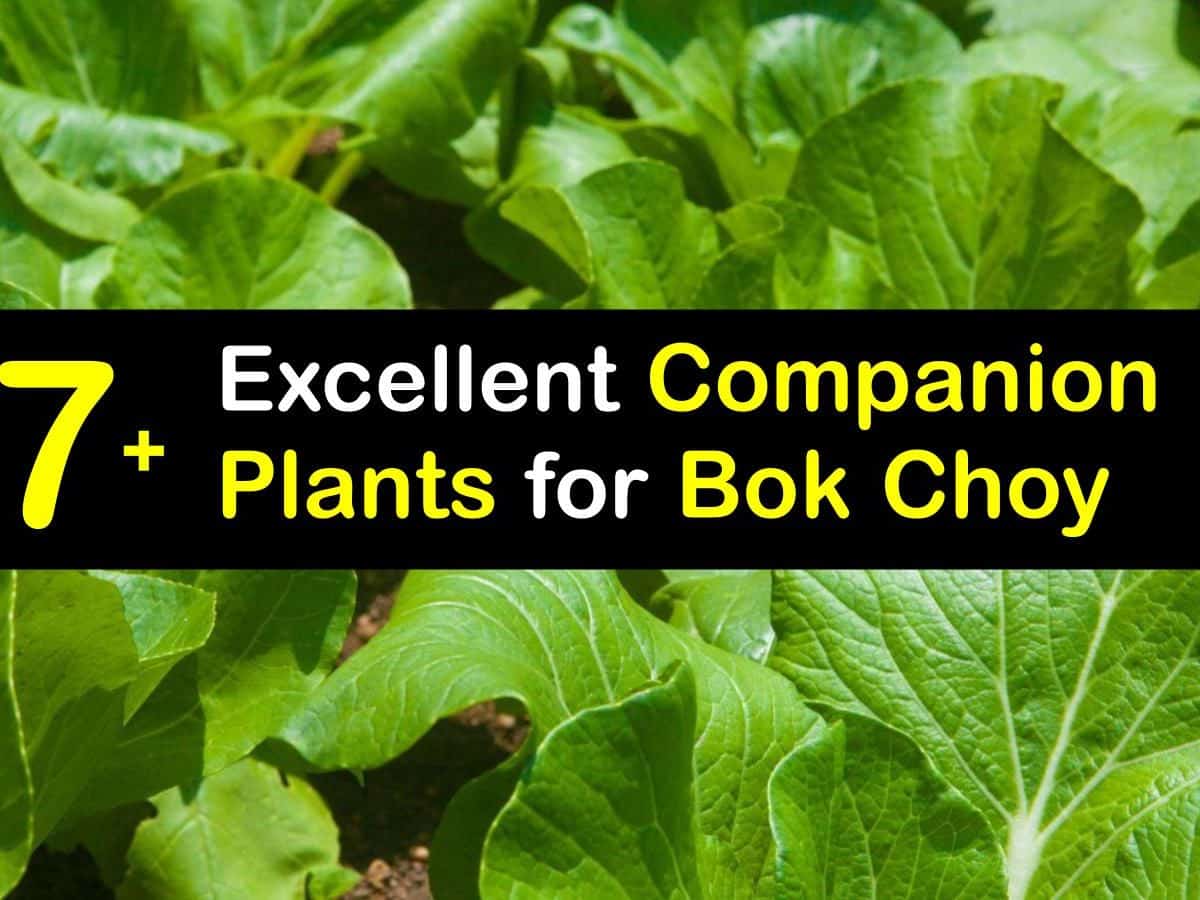Companion Plants That Will Make Your Pak Choi Thrive
Companion Planting That Will Make Your Pak Choi Thrive
Pak choi is a delicious and versatile vegetable that is easy to grow in the home garden. However, like all plants, it can benefit from companion planting. Companion planting is the practice of planting certain plants together to improve their growth and health. By planting pak choi with the right companion plants, you can help to deter pests, improve soil quality, and increase yields.
Here are some of the best companion plants for pak choi:
- Beans: Beans are nitrogen-fixing plants, which means they can add nitrogen to the soil. This is beneficial for pak choi, as it is a heavy feeder. Beans can also help to shade pak choi during hot weather.
- Carrots: Carrots and pak choi are both root vegetables, so they can share the same space in the garden. Carrots can help to improve the drainage of the soil, which is beneficial for pak choi.
- Celery: Celery is another good companion plant for pak choi. It can help to repel pests, such as cabbage moths and aphids. Celery can also help to improve the flavor of pak choi.
- Cucumbers: Cucumbers and pak choi can be planted together to help protect each other from pests. Cucumbers can help to deter cucumber beetles, which can also damage pak choi.
- Dill: Dill is a herb that can help to repel pests, such as cabbage moths and aphids. It can also help to improve the flavor of pak choi.
- Marigolds: Marigolds are another herb that can help to repel pests. They are especially effective at deterring nematodes, which can damage pak choi roots.
- Onions: Onions are a good companion plant for pak choi because they can help to repel pests, such as aphids and slugs. They can also help to improve the flavor of pak choi.
- Peas: Peas are another nitrogen-fixing plant, so they can add nitrogen to the soil. They can also help to shade pak choi during hot weather.
- Potatoes: Potatoes and pak choi can be planted together to help protect each other from pests. Potatoes can help to deter potato bugs, which can also damage pak choi.
- Spinach: Spinach and pak choi are both cool-weather crops, so they can be planted together in the same garden bed. Spinach can help to improve the drainage of the soil, which is beneficial for pak choi.
In addition to these plants, there are a few other companion plants that you should avoid planting with pak choi. These include:
- Broccoli: Broccoli and pak choi are both members of the Brassica family, so they are susceptible to the same pests and diseases. Planting them together can increase the risk of cross-contamination.
- Cabbage: Cabbage and pak choi are also both members of the Brassica family, so they should not be planted together.
- Kale: Kale and pak choi are both members of the Brassica family, so they should not be planted together.
- Lettuce: Lettuce and pak choi can compete for resources, so they should not be planted together.
- Tomatoes: Tomatoes and pak choi can compete for resources, so they should not be planted together.
By planting pak choi with the right companion plants, you can help to ensure that it thrives. With a little planning, you can create a healthy and productive garden that is full of delicious vegetables.
Pak choi is a delicious and nutritious vegetable that is easy to grow in your garden. But did you know that there are certain plants that can help it thrive? Companion planting is the practice of planting certain plants together to benefit each other. For pak choi, some of the best companion plants include:
- Carrots: Carrots help to repel pests that can damage pak choi, such as aphids and cabbage moths.
- Beans: Beans fix nitrogen in the soil, which pak choi can use to grow healthy and strong.
- Cucumbers: Cucumbers help to shade pak choi from the hot sun, which can help to prevent it from bolting.
- Dill: Dill helps to repel pests and attract beneficial insects, such as ladybugs and lacewings.
- Marigolds: Marigolds help to repel nematodes, which can damage pak choi roots.
For more information about companion planting for pak choi, please visit Gardenia Inspiration. This website has a wealth of information about companion planting, including a list of plants that are good and bad companions for pak choi.
FAQ of companion plants for pak choi
What are good companion plants for pak choi?
Pak choi is a cool-season vegetable that can be grown in the spring, fall, or winter. It prefers full sun but can tolerate partial shade. Pak choi is a member of the brassica family, so it can be susceptible to pests and diseases. Companion planting can help to protect pak choi from pests and diseases, and it can also help to improve the flavor and yield of the crop.
Some good companion plants for pak choi include:
- Beans. Beans are nitrogen-fixing plants, which means they can help to add nitrogen to the soil. This can benefit pak choi, which is a heavy feeder.
- Carrots. Carrots help to suppress the growth of harmful nematodes, which can damage pak choi roots.
- Celery. Celery helps to repel pests such as aphids and cabbage moths.
- Cucumbers. Cucumbers help to shade pak choi from the hot sun, which can help to prevent bolting.
- Dill. Dill helps to repel pests such as cabbage moths and flea beetles.
What are bad companion plants for pak choi?
Some bad companion plants for pak choi include:
- Broccoli. Broccoli is a member of the brassica family, and planting it near pak choi can increase the risk of pests and diseases.
- Kale. Kale is another member of the brassica family, and it can compete with pak choi for nutrients and water.
- Peas. Peas can attract pests such as pea moths, which can also damage pak choi.
- Potatoes. Potatoes can attract pests such as potato beetles, which can also damage pak choi.
- Tomatoes. Tomatoes are members of the nightshade family, and planting them near pak choi can increase the risk of pests and diseases.
How far apart should pak choi plants be planted?
Pak choi plants should be planted about 6 inches apart. This will give them enough room to grow and develop properly.
How much water does pak choi need?
Pak choi needs regular watering, especially during hot weather. The soil should be kept moist but not soggy.
What are some tips for growing pak choi?
Here are some tips for growing pak choi:
- Plant pak choi in full sun or partial shade.
- Amend the soil with compost or manure before planting.
- Water pak choi regularly, especially during hot weather.
- Fertilize pak choi every few weeks with a balanced fertilizer.
- Harvest pak choi when the leaves are young and tender.
Image of companion plants for pak choi
- Carrots: Carrots and pak choi are both cool-season crops that can be planted together. Carrots help to improve the soil drainage, which benefits pak choi.

- Bush beans: Bush beans are another cool-season crop that can be planted with pak choi. They help to suppress weeds and provide shade from the hot sun.

- Celery: Celery and pak choi are both members of the Apiaceae family, so they have similar growing requirements. They can be planted together to attract beneficial insects and repel pests.

- Cucumbers: Cucumbers and pak choi can be planted together in a staggered fashion. The cucumbers will grow taller than the pak choi, so they will provide shade from the hot sun.

- Dill: Dill is a herb that can be planted with pak choi to attract beneficial insects and repel pests. It also helps to improve the flavor of pak choi.

Post a Comment for " Companion Plants That Will Make Your Pak Choi Thrive"